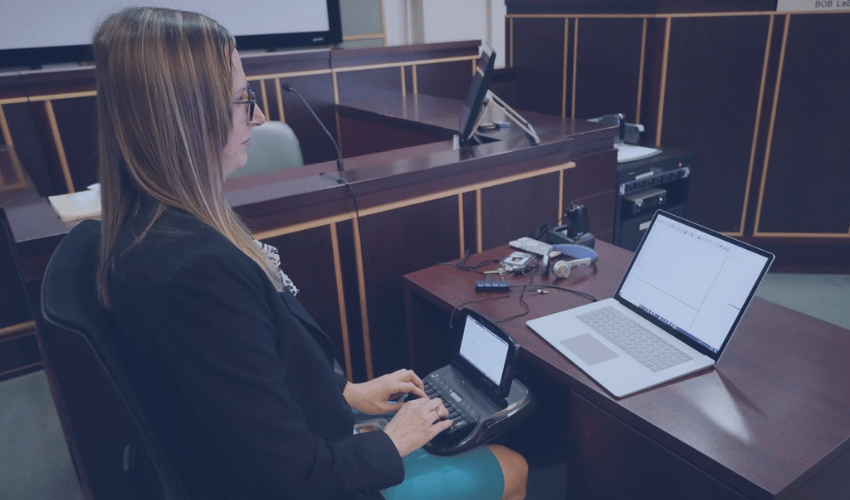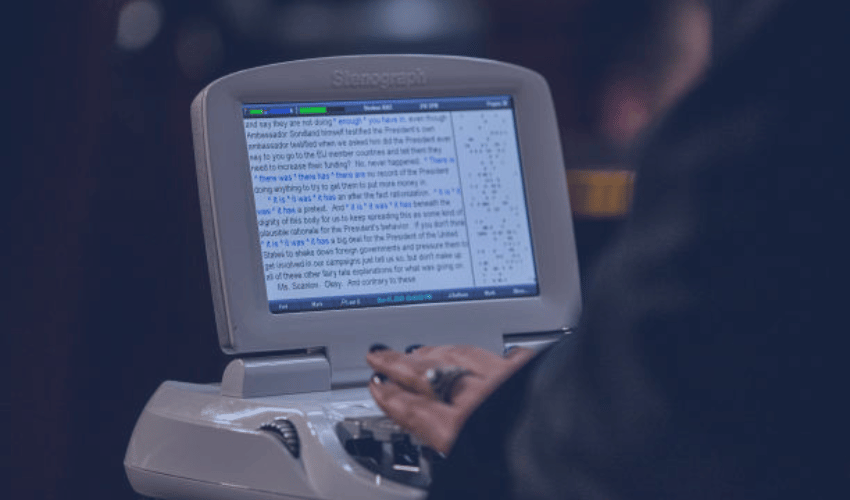AI in the Judicial System: Ethical Challenges and the Case for Human Court Reporters in Legal Proceedings
Imagine a future where algorithms, not judges, decide your fate in court. This possible reality is closer than you think. Artificial intelligence (AI) is weaving its way into the judicial system, promising efficiency and objectivity. However, this rapid integration comes with a price. This article discusses the ethical dilemma of AI in the courtroom and highlights the irreplaceable role of human court reporters in upholding justice.
Overview of AI in the Judicial System
AI is transforming how legal professionals work, from predicting case outcomes to drafting legal documents. This technology uses algorithms to analyze vast amounts of data, identify patterns, and make predictions. In courtrooms, AI manifests primarily as Automated Speech Recognition (ASR) technology, transcribing spoken words into written text.
Importance of Accurate Court Reporting
Accurate court reporting is the bedrock of the justice system. Every word spoken in a courtroom, from witness testimonies to judicial pronouncements, constitutes a crucial piece of the legal puzzle. These records ensure transparency, accountability, and the right to appeal. The integrity of these records is paramount for a fair and just legal process.
Ethical Challenges Posed by AI and ASR
The integration of Artificial Intelligence (AI) and Automatic Speech Recognition (ASR) in the judicial system presents significant ethical challenges. These concerns require careful consideration to ensure fairness, transparency, and the preservation of fundamental rights within our legal proceedings.
Data Privacy Concerns
One of the most pressing ethical considerations revolves around data privacy. AI and ASR systems depend on vast datasets for training and operation. These datasets may contain sensitive personal information, including court transcripts, testimonies, and legal documents. Ensuring the confidentiality and security of this information is paramount. Unauthorized access, data breaches, or misuse can have severe consequences for individuals involved in legal proceedings.
Imagine a scenario in which an AI system trained on a dataset containing biased information consistently renders unfair judgments or perpetuates existing societal prejudices.
Bias in AI and ASR Technologies
Another challenge stems from the potential for bias in AI and ASR technologies. These systems learn from the data they are trained on, and if the data reflects existing biases, the AI system might unintentionally perpetuate and even amplify those biases. This can result in unfair or discriminatory outcomes in legal cases, further marginalizing already vulnerable populations.
Furthermore, the accuracy of digital recordings, while often touted as a benefit, could be more accurate. Background noise, accents, or technical glitches can compromise the integrity of audio recordings. Relying solely on such recordings without human oversight can lead to errors or misinterpretations, potentially impacting the outcome of a case.
Reliability of Digital Recordings
The reliability of digital recordings is not absolute. Technical failures, storage issues, or even intentional tampering can compromise the integrity of digital evidence. This inherent vulnerability necessitates robust safeguards and protocols to ensure the authenticity and reliability of recordings used in legal proceedings.
The Unmatched Value of Human Court Reporters
While AI and ASR offer technological advancements, they lack the nuanced understanding, ethical judgment, and human touch crucial to the judicial process. Human court reporters, with their specialized training and commitment to accuracy, remain indispensable to upholding justice and ensuring a fair and impartial legal system. Let's explore the reasons why.
Accuracy and Reliability
Human court reporters provide a level of accuracy and reliability that AI and ASR systems are still striving to achieve. Trained extensively in legal terminology, courtroom procedures, and speech patterns, these professionals possess an acute ear for detail and can decipher even the most complex legal arguments. Unlike AI, human reporters can distinguish between speakers with similar voices, understand mumbled or overlapping speech, and accurately transcribe spoken words despite accents, dialects, or emotional distress.
This human ability to interpret and contextualize spoken language is essential for producing a complete and accurate record of court proceedings. Inaccuracies or omissions in transcripts can have significant consequences, potentially impacting the outcome of a case. Human court reporters serve as guardians of the spoken word, ensuring that every statement, objection, and ruling is faithfully recorded.
Real-Time Reporting and Immediate Access
A significant advantage of human court reporters is their capability to provide real-time reporting using stenography. Stenography allows judges, attorneys, and parties involved to have immediate access to the transcript as it unfolds. Real-time reporting expedites legal proceedings by facilitating immediate clarification of testimony, quick resolution of disputes over spoken words, and efficient preparation of motions or arguments.
Imagine a key witness testifying in a complex trial. With real-time reporting, the judge can instantly review previous statements, attorneys can quickly verify details for cross-examination, and the parties involved can have a clear understanding of the ongoing proceedings. This immediacy is invaluable in maintaining the pace and efficiency of legal proceedings.
Maintaining Judicial Integrity and Trust
Beyond accuracy and efficiency, human court reporters play a vital role in maintaining judicial integrity and public trust in the legal system. Their physical presence in the courtroom provides a sense of human accountability and ensures that proceedings are recorded without outside manipulation or bias.
The presence of a human court reporter deters potential misconduct or tampering with the official record. It assures all parties involved that their words are captured accurately and impartially, fostering a sense of fairness and transparency. This human element is crucial in upholding the integrity of the judicial process and maintaining public confidence in the administration of justice.
Conclusion
The intersection of artificial intelligence (AI) and the judicial system presents significant ethical challenges. While AI has the potential to streamline certain aspects of legal proceedings, we must approach its implementation in verbatium testimony with careful consideration for its limitations and potential consequences. The pursuit of efficiency should never come at the expense of accuracy, fairness, or the fundamental rights of individuals involved in the legal process.
At MTDS Reporters, we understand the critical role of accurate and reliable court reporting in maintaining the integrity of the judicial system. Our highly trained and certified human court reporters ensure that every word is captured accurately and impartially. Contact us today to learn more about our services and how we can support your legal proceedings with unmatched professionalism and expertise.



